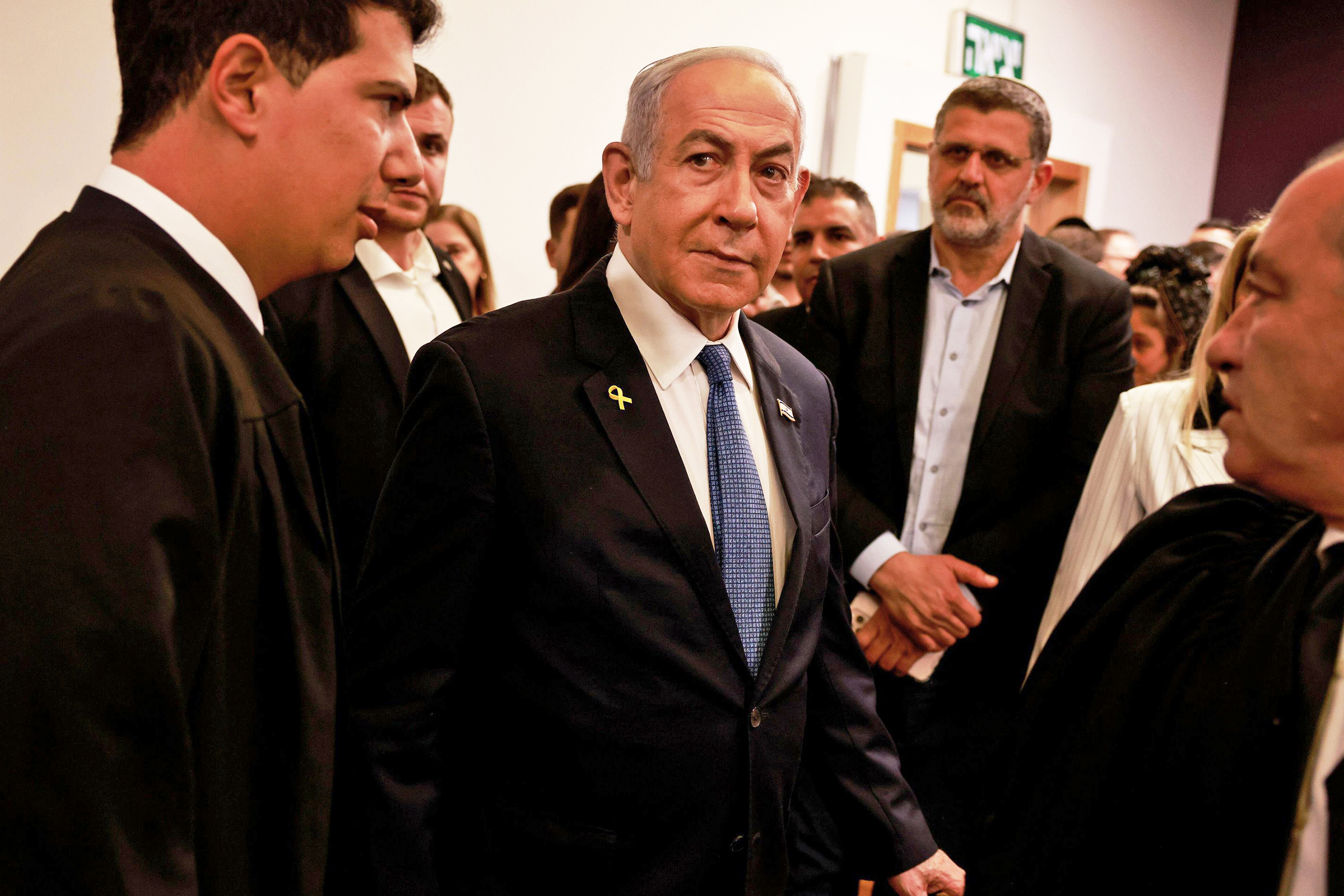Cohiba is the Rolls-Royce of cigar manufacturers. Its Behike 56, for example, costs over $1500 for a box of ten. Handmade in communist Cuba, the Cohiba brand was Fidel Castro’s favourite smoke.
Benjamin “Bibi” Netanyahu, the leader of the most right-wing government in Israel’s history, is also a big fan of these famous cigarros cubanos. His wife, Sara Netanyahu, on the other hand, enjoys her champagne: Dom Pérignon, if you don’t mind. Even the cheapest bottle of Dom will set you back about $400. Mrs Netanyahu also believes that diamonds are a girl’s best friend.
Luckily for Israel’s premier power couple, they have rich friends willing to keep them supplied with A-grade stogies, pricey bubbly and jewel-encrusted bracelets. Unfortunately for them, evidence came to light that these valuable commodities, amounting to hundreds of thousands of dollars over several years, might have been exchanged for prime ministerial favours.
Israeli police began investigating in December 2016. Besides the accusations of exchanging favours for gifts, it is also alleged that Mr Netanyahu did favours for media owners in return for positive news coverage. The most powerful man in Israel was indicted in 2019 and stands accused of bribery, fraud and breach of trust. He is currently defending himself before the Israeli courts.
In early 2023 footage of the police interrogations of Mr Netanyahu, Mrs Netanyahu and various other witnesses was leaked to the veteran American documentary film-maker Alex Gibney. Gibney enlisted the Emmy-nominated director Alexis Bloom to turn this material into a documentary. He also brought on board the Israeli investigative journalist Ravid Drucker. The Bibi Files, which screened last week at the Jewish Film Festival in Sydney, is the result.
Though not especially cinematic — it looks like a longer-than-normal and very well produced and edited Four Corners — it’s a fascinating piece of work. Courtesy of the leaked footage, we go inside the room where powerful people, stripped of their charisma, must face the law of the land.
At its heart The Bibi Files is the story of a married couple who have seemingly lost their moral compass by committing the sin of hubris. One of the several critical voices in the film summarises the Netanyahu’s position simply as: “I deserve it, and I can get away with it.”
Prime Minister Netanyahu handles his ordeal under interrogation with a mixture of bluster and table thumping. “There is a whole industry trying to incriminate me,” he complains at one point. Well, yes, it’s called the Israeli justice system.
He calls the claims made against him delusional nonsense. But every so often his face flickers with anxiety. When he’s not obfuscating, he says he can’t recall important events. One of the police officers risks some gentle chiding. “Do you realise,” he asks, “that you respond to 95 per cent of our questions with ‘I don’t remember’?”
The portrait that emerges of Sara Netanyahu is even more damning. She drinks too much. She shouts at staff and berates underlings. Two witnesses say that Bibi is scared of her. Though unelected, she has great influence on government decision-making.
Her personality is powerfully revealed in the police footage. Under questioning, she is contemptuous of the officers who are simply doing their job: “Your evidence is complete and utter bullshit!” she yells at them. But, by God, she is loyal to her man. “Listen to me,” she says to the cops. “The prime minister is the most principled and honest person in the world.”
Besides the PM and his wife, the film is populated by a cast of colourful characters. Several aged Israeli billionaires dressed like schlubs in sneakers and T-shirts turn up to be hauled over the coals. Maybe they don’t think it wise to flaunt their wealth during a corruption investigation.
Among those who supplied booze and cigars to Bibi and Sara is the Hollywood wheeler-dealer Arnon Milchan. “You can’t say no to them,” says his personal assistant Hadas Klein. “There’s no such thing as showing up empty-handed.” In return, Milchan is alleged to have received a tax benefit and had a US visa problem sorted out after the prime minister intervened personally with the then secretary of state John Kerry.
Milchan’s equally badly dressed fellow billionaire Shaul Elovitch is alleged to have traded the journalistic integrity of a news website he owned for Netanyahu’s signature on a document that released hundreds of millions in cash to him at a time when the banks had him by the proverbials.
If proven, this is surely corruption. But it’s not gold-medal winning corruption. What Gibney and Bloom really want the world to know is the bigger story of how the corruption investigation has affected Netanyahu’s decision-making as prime minister.
“Nothing concentrates the mind like the prospect of being hanged,” as Nimrod Novik, a former adviser to former Israeli PM Shimon Peres, reminds us. “With Netanyahu, nothing concentrates his mind more than the sound of the prison gate slammed behind his back.”
Despite being charged with corruption, Netanyahu refused to resign from office, as many advised him to do. The major centre-left parties in the Knesset refused to support him, so he turned to Israel’s far right in order to survive politically. He welcomed into his cabinet men who just a few years ago he would refuse to be photographed with.
A violent racist named Itamar Ben-Gvir is now national security minister. His fellow right-winger Bezalel Smotrich is finance minister. Ami Ayolan, the former head of Shin Bet, Israel’s version of ASIO, calls Smotrich a “Jewish terrorist.”
In 2023 Netanyahu introduced judicial reforms that would have altered the balance of power in favour of the legislature and away from the judiciary. To many Israelis it looked like an attack on democracy itself, designed to protect the PM from the nation’s legal system. As Ayolan explains in The Bibi Files, Netanyahu was attempting to “break the bones of the system before they are coming close to determining his political and personal fate.”
The move triggered the biggest street demonstrations in Israel’s history. In early 2024 the Supreme Court ruled against the new law, arguing that it would have caused “severe and unprecedented damage to the basic characteristics of the State of Israel as a democratic state.”
By then had come the horrors of Hamas’s 7 October attack, the largest loss of Jewish life on a single day since the Holocaust. The makers of The Bibi Files make the argument that many of Netanyahu’s decisions as a wartime PM are about keeping himself in power, and therefore out of jail.
In November 2024 the International Court of Justice issued an arrest warrant against Mr Netanyahu for alleged crimes against humanity relating to the war in Gaza. It’s unlikely that he’ll ever be arrested and taken in handcuffs to The Hague.
But the domestic corruption charges examined in The Bibi Files are a different matter. They could yet see him end up in prison. Being prime minister is no protection from the law in Israel. His predecessor as PM, Ehud Olmert, was convicted on similar corruption charges and ended up in the Big House for more than a year.
After many delays, Netanyahu was back in court last week. In his first day of testimony, true to form, he blamed a biased media for getting him into this mess.
The charges against him were laughable, he said. Why didn’t anyone understand? He only allowed himself a rare cigar — and he never had time to finish it anyway because of the pressure he’s under as PM.
“Sometimes I sin with a cigar that I can’t even smoke in peace because of the constant interruptions,” he complained to the court, “And by the way, I hate champagne.” •
The Bibi Files is available to stream on DocPlay. The film can’t be shown in Israel because footage of Israeli police interrogations can only be broadcast there with the permission of the person being interrogated.




